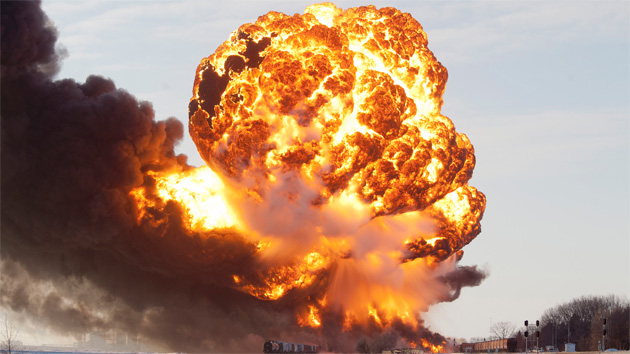On Wednesday afternoon, a CSX train carrying crude oil jumped its tracks in downtown Lynchburg, Virginia, sending three tankers careening into the James River with a fiery load; it was the second derailment for the company this year. While no one was injured, the fire burned for hours, and more than 300 people were evacuated from the nearby area. “The river was on fire,” deputy city manager Bonnie Svrek told The Washington Post.
It’s still unclear how much of the missing 50,000 gallons of crude was burned and how much spilled into the river. The video footage above—shot from a drone—shows just how close the derailment was to both the town and the river.
Meanwhile, this next Instagram video shows the intensity of the fire:
This derailment is the latest in a series of fiery accidents involving oil tankers. According to the Association of American Railroads, the amount of crude oil traveling by rail skyrocketed from 9,500 carloads in 2008 to an estimated 400,000 in 2013. Our analysis published in February showed that in the United States, seven of the 10 worst railroad oil spills of the past decade happened in the last three years, totaling nearly $2 million in damages. (This number doesn’t include the catastrophic accident in Lac-Megantic, Quebec, last July, which decimated the town and killed 47 people.)
US regulators have promised safer, more robust tanker cars in new regulations due out soon. Spurred by Lac-Megantic disaster, the Canadian Government last week issued tough new laws for the transportation of oil by rail, promising to retire older cars and replace them within three years, and making sure railways have emergency plans for responding to explosions.
Yet—despite evidence that shows the older tank cars are more susceptible to rupture after a derailment—the United States lags behind Canada: Its proposed new rules have yet to be passed. As recently as mid-April, policy makers met in Washington to discuss the problem, showing videos of older cars rupturing during a puncture tests and spraying their contents, according to reports. Robert Fronczak of the Association of American Railroads told the meeting of the National Transportation Safety Board that eliminating them by attrition alone could take 40 to 50 years.

















